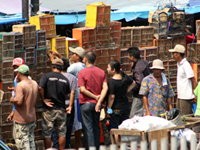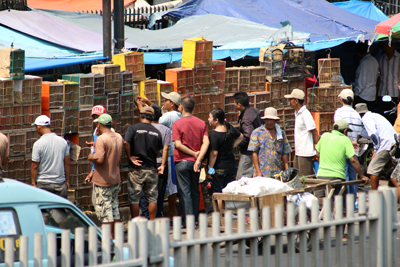
Jakarta has become a center of illegal wildlife trade as a result of the ease of bringing animals into the city, a top conservation agency official has claimed.
Awen Supranata, the head of Jakarta’s Natural Resources Conservation Agency (BKSDA), said the agency, in cooperation with law enforcement institutions, had stopped the trade of at least 30 endangered species in the capital in 2015.
“Most of the species were gibbons and various species of birds,” Awen told The Jakarta Post recently.
In November, the Jakarta Police and BKSDA Jakarta foiled an attempt to trade two Sumatran gibbons, one clouded leopard, one honey bear and four birds of paradise in several locations, including a bird market in Jatinegara, East Jakarta.
Six suspects, allegedly part of an international syndicate, were arrested. According to the suspects, they had previously smuggled two orangutans to Dubai and one honey bear to Kuwait via Jakarta.
Earlier in August, BKSDA Jakarta also thwarted an attempt to smuggle 15 tons of horned helmet shells and other endangered scallop species through Tanjung Priok Port.
The confiscated animals were brought to BKSDA Jakarta’s animal rescue center in Tegal Alur, West Jakarta, for medical checkups pending release into their natural habitats. Awen said the rescue center, which was currently being renovated, could accommodate up to 300 animals.
“Jakarta is one of the favorite places from which to smuggle endangered species, which are usually brought in from West Java, West Kalimantan and Sumatra,” Awen said.
He added that the most common destination countries for endangered species smuggled from Indonesia were China, Taiwan, Hong Kong and the Netherlands, saying that most of the animals were smuggled at the request of people who have superstitions about certain animals.
“For example, some people in China believe a hornbill beak can prevent bad luck and has a healing effect. While in fact, the hornbill is simply an endangered species,” he continued.
He went on to say that the BKSDA and law enforcers tried various approaches to stymie the trade, including raising people’s awareness of the law on endangered species and actively trying to catch smugglers.
Unfortunately, he said, there were still markets in Jakarta that were infamous as a safe haven for illegally trading endangered animals, including Jatinegara Bird Market in East Jakarta. He said that his officers had repeatedly warned local traders as well as raided the area.
“However, we have very limited resources and most traders recognize our officers. When we go there they often flee and leave the endangered animals. So we confiscate the evidence, but fail to arrest the traders,” he continued.
Contacted separately, Marison Guciano from wildlife trade monitoring group Scorpion said he appreciated the BKSDA’s work to protect endangered animals in Indonesia, but said that efforts at present were still far from enough.
Marison said the illegal wildlife trade in Jakarta was out of control and cracking down on places like Jatinegara Bird Market and Pramuka Market in East Jakarta should be one of the BKSDA’s top priorities.
“We commonly see endangered animals such as eagles, kites, hawks and even crocodiles being traded there,” he told the Post, adding that trading animals through the internet was now growing in popularity.
Marison said that Jakarta was a transit area for many species from Sumatra due to the relative proximity of the two areas and the many ships that travel between the two regions. “For example, orangutans from Sumatra are smuggled to Jakarta before being sent to other places,” he said.

Jatinegara wildlife market, Jakarta. Photo: SCORPION.

Jatinegara wildlife, Jakarta. Photo: SCORPION.

Pramuka wildlife market, Jakarta. Photo: SCORPION.